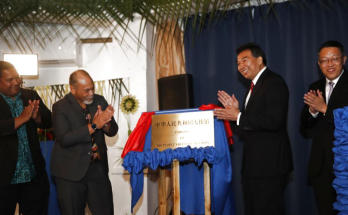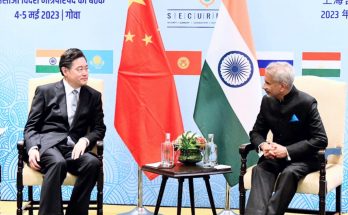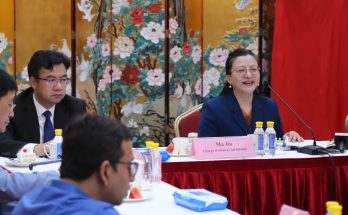 More than 100 Chinese journalists, cutting across print and electronic media, descended on the Brazilian port city of Fortaleza to track the sixth BRICS summit. People’s Daily, the state-owned Chinese daily, brought out a special BRICS edition and circulated it to delegates and media persons of other countries.
More than 100 Chinese journalists, cutting across print and electronic media, descended on the Brazilian port city of Fortaleza to track the sixth BRICS summit. People’s Daily, the state-owned Chinese daily, brought out a special BRICS edition and circulated it to delegates and media persons of other countries.
The BRICS’ creation of a new $100 billion development bank and emergency reserve fund on July 15, triggered waves of jubilation among Chinese media. The bank is to be headquartered in Shanghai. The declaration was made at the sixth BRICS summit held in Brazil.
The Chinese media has commented on a range of issues, and has been quite upbeat that BRICS, as a unique grouping of five diverse emerging economies, will help reform the global financial structures. Sections of Chinese media argued for greater collaboration among media outlets of BRICS countries to counter the Western media’s negative portrayals of the grouping.
While some media outlets have hailed the creation of the New Development Bank as a victory for the developing world, others have cautioned that much work remains to be done.
Xu Yili, a commentator with China Central Television, said China’s massive foreign reserves and stable political environment aided in the selection.
Many media outlets in China, including the popular Chinese edition of The Global Times, have noted the negative reactions of some Western media to the creation of the bank. They argue that it was the West’s reluctance to reform global financial institutions that compelled BRICS to set up a bank.
However, the People’s Daily tried to play down the debate over the role of the new bank in challenging the West-led international financial system.
It argued that the New Development Bank and the contingent reserve arrangement would supplement rather than compete with the current global financial system:
“Loans from the World Bank are not able to meet the demands of the developing nations, and only a slice of the direly needed funding on infrastructure, is from the World Bank. The IMF also failed to play an active role in stabilizing turbulent emerging financial markets during the global financial crisis.”
Miffed at certain Western media outlets for undermining the progress made by the BRICS, the Chinese edition of The Global Times referred to such reports as a case of “sour grapes.”
The sentiment was echoed by the Xinhua news agency, which was critical about the manner in which some Western media “joyfully drum up the differences and disagreements between BRICS countries.” The news agency added that “it is this very diversity that can motivate rather than impede cooperation. BRICS is a new development model, one that is conducive to improving global economic governance.”
“BRICS, only formed in 2009, is still far from dominating global trade and investment, but nonetheless, combining emerging economies to benefit peoples from five countries contributes to democratic international relations. While the group grows into a force for a more just and democratic world, it deserves support and applause.”
Xinhua has also published an article by its president Li Congjun, arguing that even two decades since the end of the cold war, the flow of global information remains unbalanced and in favour of the West. Congjun calls on media organisations of the BRICS countries to increase collaborative efforts to propel support and political influence for BRICS in international communication.
“Voices of developing countries are often drowned out by the much louder media of the West. What we wanted to tell the world was hardly heard,” the article said.
Reprinted by several media outlets in BRICS countries, the article labels the BRICS as “representatives of the world’s emerging economies.” It states that while BRICS countries have laid a solid foundation for economic cooperation, much needs to be done to increase their political influence in the international community.
Author Profile
- India Writes Network (www.indiawrites.org) is an emerging think tank and a media-publishing company focused on international affairs & the India Story. Centre for Global India Insights is the research arm of India Writes Network. To subscribe to India and the World, write to editor@indiawrites.org. A venture of TGII Media Private Limited, a leading media, publishing and consultancy company, IWN has carved a niche for balanced and exhaustive reporting and analysis of international affairs. Eminent personalities, politicians, diplomats, authors, strategy gurus and news-makers have contributed to India Writes Network, as also “India and the World,” a magazine focused on global affairs.
Latest entries
 DiplomacyApril 10, 2024Diplomat-author Lakshmi Puri pitches for women power at LSR
DiplomacyApril 10, 2024Diplomat-author Lakshmi Puri pitches for women power at LSR India and the WorldApril 6, 2024UN envoy pitches to take India’s solutions to the world stage
India and the WorldApril 6, 2024UN envoy pitches to take India’s solutions to the world stage CultureApril 5, 2024Youth in Diplomacy: Making it Matter with LSR Model UN 2024
CultureApril 5, 2024Youth in Diplomacy: Making it Matter with LSR Model UN 2024 India and the WorldMarch 28, 2024India to China: Normalization of troops deployment imperative for restoring ties
India and the WorldMarch 28, 2024India to China: Normalization of troops deployment imperative for restoring ties







